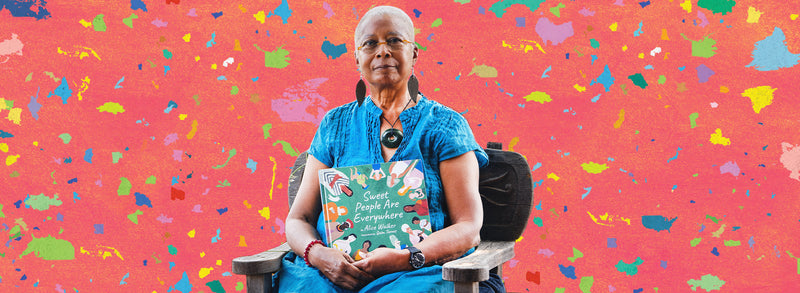
This book is one of the dozens of books Alice Walker has written. Her novels, poetry, essays, and children’s books have sold more than fifteen million copies, and her writing has been translated into more than two dozen languages. People all over the world read Alice’s books! Sweet People Are Everywhere is about traveling and meeting people in many different countries, which Alice has done. She likes to travel, but she also likes to be at home in her house in Mendocino, California, which is way out in the country. When we spoke to her, she was sitting on her deck and looking out at the mountains. She told us she loves living in the country. She is thankful that she grew up in the countryside, in Putnam County, Georgia, where she was born in 1944. Her parents were farmers and she was the youngest of eight children. Because she was the youngest, she was called Baby Alice. And when she was very small—still just a baby—she started writing. And she has not stopped!
The words of this book are a poem you wrote that is dedicated to “young Bryon, who is getting a passport.” Who is young Bryon?
Young Bryon was a houseguest of mine. He was a teenage musician planning a trip to China. Though he was nineteen or so, he had never traveled outside of the United States. He was nervous about being so far from his home and his church, where he played gospel music on piano.
What did you say to help him feel less nervous?
I encouraged him to think of the whole experience as an adventure. I wanted to assure him that no matter what a country’s government is doing while you are visiting, the people continue to be like people everywhere. They are caring for their children, their gardens, their fields, or learning new amazements on their computers. The Bryon in this poem wants to see the world, and he needs to see the world. He is going to meet other people who are like him. I wanted him to feel like the world is small, really. The poem was written to him and sparked by his adventure, but it is for all young people.
There are thirty-seven different places that you write about in this book. Places like Ireland and Iraq, Venezuela and Vietnam, Kenya and Korea. Have you been to the countries you mention here?
I have been to some of them. I came from a tiny place in Georgia, and I had no idea there were people all around the world. They told me if I dug deep enough, I would reach China. But really, I had no idea. I want children reading this to become familiar with the idea that other places exist.
Do you like to travel?
Every chance I have had to go and see someplace, I have taken it! And that is how I discovered the sameness in people. You can kind of recognize yourself in everyone. Gulliver’s Travels is not really the truth. I mean, there is truth in it, but you don’t go to a city and people are horses. They are you and your parents, but they may be a different color and wearing different clothing. There are not “foreign” countries. You get over there and yes, the food is different but you love it. And the people are the same.
When did you start writing?
Shortly after birth. My mother says that when I was crawling, I was writing in the dirt with a stick. I was writing poetry by the time I was nine. But I was memorizing it and reciting it much earlier.
What drew you to poetry at such a young age?
Someone gave me Gulliver’s Travels just before I turned twelve. The wonder of that book! I was someone who had never thought about those creatures—creatures like tiny people and giants and horses that talk. Part of my impetus for writing was wanting to help others see what I was feeling.
What do you like the most about writing?
It’s magic. You can create something. And you can make it so visual that other people can see it, but it actually comes out of the invisible.
Besides being a writer, you are also an activist. What kind of causes do you work for?
So many causes! My deepest concern is for the children of the world. Right up there with the animals of the planet. And on and on. There is a whole long list! It is not just that nature is being destroyed. Children all over the world are being harmed.
What would you do if you were not a writer?
I wanted to be a scientist at one point. And a pianist at another. And those things were completely unaffordable. I don’t regret anything. When doors are closed that you wanted to open as a child, you realize that perhaps part of your reason for being is to open them for others. And that is part of what this poem is about.
Do you have advice for children who want to explore their creativity?
Yes! In order to create art, you have to have tools. Paper and crayons and maybe paint. If you are really small, ask your parents for supplies. You don’t have to write in the dirt with a twig-like I did. But I love that image because it shows that even as an infant, I knew I had to have a tool. I wasn’t using my fingers—I was using twigs. If you have the desire to make something, you are making it virtually out of nothing. Think about what you need to do that and acquire those things.